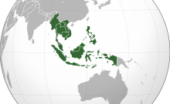Molly Minturn - My family is heartbroken to share that my father died in surgery on Monday, Feb. 10. It…
Asia in 2008
Written by Diana Thebaud Nicholson // December 20, 2007 // Asia, China, Economy // Comments Off on Asia in 2008
20 December 2007
The Economist
The Olympics put China on the international stage
IF THIS is to be the Asian century, future historians might pinpoint 2008 as the year it truly began. Curiously, the event that will symbolise this is rooted deep in Western tradition: China’s staging of the Olympic games in Beijing next August.
As with Berlin in 1936, Tokyo in 1964 and Seoul in 1988, the Olympics will symbolise the emergence as a global force of a country until recently mired in poverty and upheaval. The election in November 2007 of a new Australian government led by a Mandarin-speaker (Kevin Rudd) will be seen as recognition of the new international order.
But the emergence of China is unprecedented in its implications for the world’s economy, environment and security. The world’s most populous nation will soon be its biggest polluter and its biggest trader. Its breakneck growth makes it, as one leading Western economic commentator put it, a giant cuckoo in the global nest. In China the Olympics will mark a justified celebration of its reclaimed international stature; the rest of the world will nervously calculate what that means.
Nowhere will that process of calculation be more frenzied than in China’s immediate neighbourhood. Unlike in China, events in many Asian countries will be determined by elections—a bewildering number of which are taking place at the turn of the year, in (to name but a few) Kyrgyzstan, Pakistan, South Korea, Taiwan and Thailand.
Even a local election this month in the large Indian state of Gujarat—which involves more voters than most national elections—may have international implications. A good showing by the Congress party, which leads the governing coalition, may encourage it to call national elections.
If they are held, they will be fought partly over the proposed deal on civilian nuclear co-operation with America. This is presented as a matter of meeting India’s yawning energy gap. But in reality, on both sides, it is about hedging against the risk of a China that turns hostile. To the dismay of the American establishment, many in India would prefer to hedge against over-dependence on American assistance.
That feeling may intensify if Pakistan continues its slide into chaos. Whether or not next month’s elections produce the scripted result—Pervez Musharraf continues as president, while Benazir Bhutto becomes prime minister, a job she has held twice already—China will have an important role in legitimising the new regime.
Similarly, China’s other neighbours prefer co-operation and placation to confrontation and hostility. In Japan, no election has been called, but one remains likely in early 2008, as the government struggles with the legislative deadlock resulting from the opposition’s command of parliament’s upper house. Any government is likely to continue the improvement in relations with China that has followed the departure, in 2006, of Junichiro Koizumi as prime minister.
The biggest regional issue in South-East Asia will also demand China’s help. The bloody suppression of protests in Myanmar in September 2007 reminded members of the Association of South-East Asian Nations (ASEAN) that this brutal, superstitious, archaic regime is an obstacle to ASEAN’s being taken seriously, and that China is Myanmar’s biggest foreign friend.
Its biggest export market, however, remains Thailand, whose election on December 23rd should mark a return to democracy. But like Myanmar’s junta and Mr Musharraf, and indeed the Chinese Communist Party, the generals running Thailand remain scared of the will of the people, freely expressed. Games are easier.
Foreign Affairs
January/February 2008
China is changing rapidly, and its rise has led to widespread fears in western capitals. But Beijing’s rapid economic growth and increasing political clout will not spell the demise of the liberal international order, argues G. John Ikenberry, so long as the West plays its cards correctly. As part of a special package on China, John Thornton assesses the prospects for Chinese democracy nearly two decades after the Tiananmen Square protests; Stephanie Kleine-Ahlbrandt and Andrew Small reexamine Beijing’s policy of nonintervention and its relations with pariah states; and David Hale and Lyric Hughes Hale warn that forced currency revaluation is not the solution to the large U.S.-Chinese trade imbalance.



